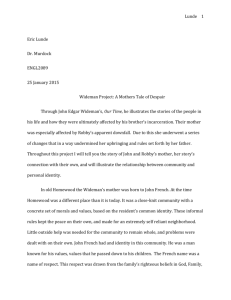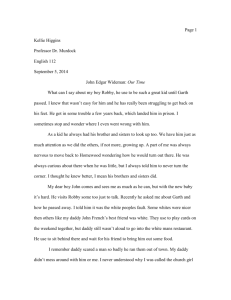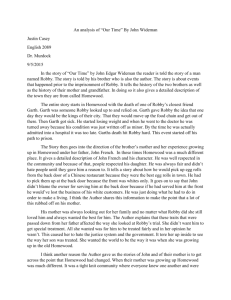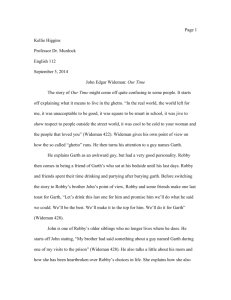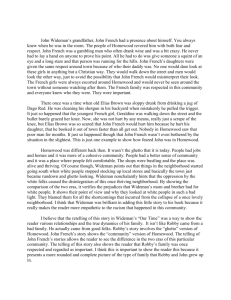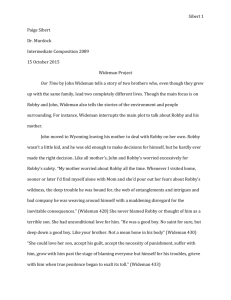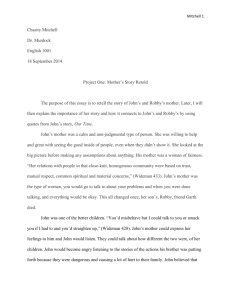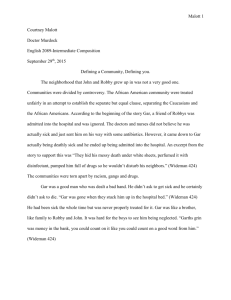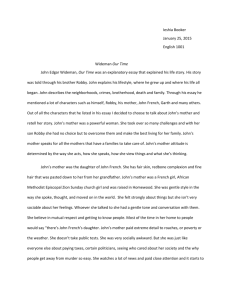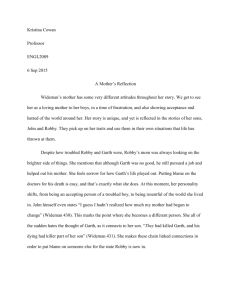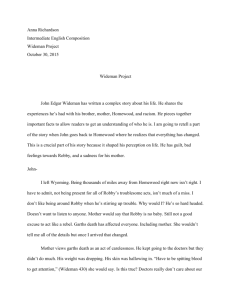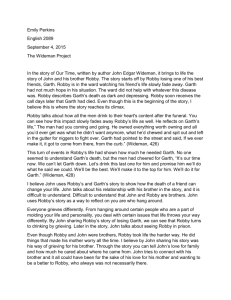Petrescu Catalina Wideman Project Final
advertisement
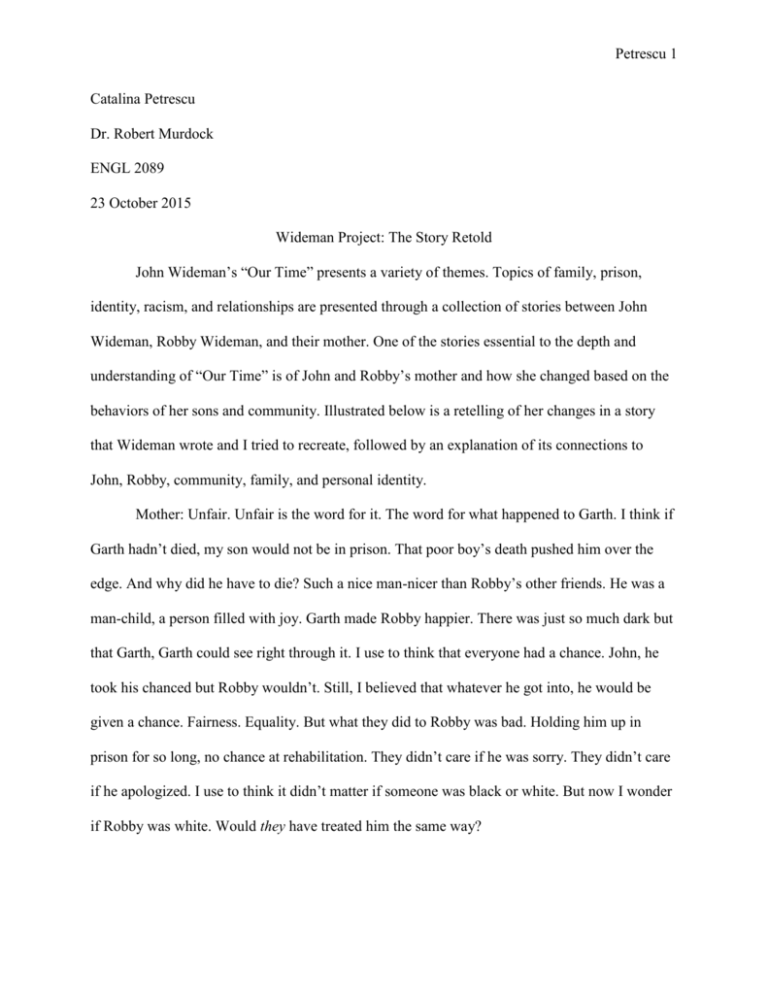
Petrescu 1 Catalina Petrescu Dr. Robert Murdock ENGL 2089 23 October 2015 Wideman Project: The Story Retold John Wideman’s “Our Time” presents a variety of themes. Topics of family, prison, identity, racism, and relationships are presented through a collection of stories between John Wideman, Robby Wideman, and their mother. One of the stories essential to the depth and understanding of “Our Time” is of John and Robby’s mother and how she changed based on the behaviors of her sons and community. Illustrated below is a retelling of her changes in a story that Wideman wrote and I tried to recreate, followed by an explanation of its connections to John, Robby, community, family, and personal identity. Mother: Unfair. Unfair is the word for it. The word for what happened to Garth. I think if Garth hadn’t died, my son would not be in prison. That poor boy’s death pushed him over the edge. And why did he have to die? Such a nice man-nicer than Robby’s other friends. He was a man-child, a person filled with joy. Garth made Robby happier. There was just so much dark but that Garth, Garth could see right through it. I use to think that everyone had a chance. John, he took his chanced but Robby wouldn’t. Still, I believed that whatever he got into, he would be given a chance. Fairness. Equality. But what they did to Robby was bad. Holding him up in prison for so long, no chance at rehabilitation. They didn’t care if he was sorry. They didn’t care if he apologized. I use to think it didn’t matter if someone was black or white. But now I wonder if Robby was white. Would they have treated him the same way? Petrescu 2 John: I didn’t think that mother had changed, until I saw her in the kitchen. I watched her as she talked to me in frustrations about Robby, and I watched her again as she told me about Garth. It wasn’t that she had more lines around her mouth from frowning. It wasn’t that she had more of a furrow to her brow. And it wasn’t that she looked more aged. Yes, she had all these things, but it was the look of anger, bitterness, and resentment on her face that carried into her conversations that I watched. Growing up, she was the calm one. She could get mad like any other mother, threaten to have my father beat me up, and yell at me to do this and that. But she was also reserved, just like Grandpa French. It was like she chose to take a step back and give people kindness when others darted forward. She was gentle. Garth and Robby had made her harder, rougher. It wasn’t them that changed her. It was them. “The Man.” The one who decides who gets medical treatment and who gets fairness in court, the one that decides you get to die and you get locked away forever. I know that my mother can take of herself. And even if she really needed me, I was too far away to really be there in an instant. But I use to think that even if she could take care of herself, she wanted me around. But now it was like she forgot I was even there when she was talking about Robby. I knew that she still loved me, but when she talked on and on about what happened to them, I couldn’t help but think of the Homewood saying, “You said that to say what?” (Wideman 436). This part of Wideman’s essay is essential to the story of John and Robby because their mother links them. Right after this part, John finally talks to Robby. And goes on for three hours. Their mother is the reason they are still in contact with each other. If she would have disowned Robby or had given up hope that he could change after he was arrested (like some families do) then it would have given John a perfect reason to disown him too. No, it does not mean that he had to because his mother did, but it would have made it easier for him to let go. However, he Petrescu 3 does love his brother and so does his mother. Her unchanging love for Robby, her worries and her rants about him were one reason John went to see him. Their mother’s beginning in Homewood and their strict grandfather that everyone both respected and was afraid of plays into how they were raised. Unlike Robby, their mother was not a part of the bad crowd but of “those French girls” which was a positive perception. On the other hand, just because Robby killed a person does not necessarily make him an incorrigible individual. Dying Garth said, “You’re good, man. Don’t ever forget, Rob. You’re the best” (Wideman 424). This makes Robby a much more complex character instead of the bad brother, the disappointment, the thug, or the convict. The way Robby was raised impacts his character: the nature versus nurture argument. Robby’s mother would not have a story without her boys and they would not have a story without her. Family connections ties into identity as well because so much of our identity is shaped by where we are from, who raised us, and who we believe we are. For example, it rains in Cincinnati one day, is 86 degrees another day, and then snows the next. When someone not from Cincinnati comments on these anomalies, Cincinnati folk never fail to respond with, “Welcome to Cincinnati.” Just like that, they are making a connection between who they are and where they are from. The connections in this particular essay between family/community and personal identity are specific to Homewood and the French people. The Frenches were well-known people in their community and Robby and John’s mother was a “French Girl.” According to Wideman, “A French girl was somebody who lived in Cassina Way, somebody you didn’t fool with or talk nasty to. Didn’t speak to at all except in certain places or on certain occasions. French girls were church girl, Homewood African Methodist Episcopal Sunday-school-picnic and social-event young ladies” (434). This statement about French Girls epitomizes the connections between Petrescu 4 home and identity, as being known as somebody and being known a certain way lead to parts of someone’s identity; it is a reputation. Robby grew up into this proud, French family reputation, which played into his identity as a gang member as he wanted to be a part of something, to be important; he just went about it in a different way that his mother did. John on the other hand, took his Homewood beginnings and grew out of it, trying to make a reputation for himself that did not rely on neighborhood information or community pride but relied on his work as a scholar and his reputation in the world where people critique your book instead of testify against you in court. John Wideman based “Our Time” on his personal life situations with his brother Robby and their mother. The themes he introduced of family, prison, identity, and racism are presented through his stories of his families and their situations. The mother’s story in “Our Time” is a key component in the lives of her sons, their connections to the world, and their personal identities. Her changes link Robby and John together while her Homewood community ties into her identity as a French girl and a mother. Petrescu 5 Works Cited Wideman E, John. “Our Time.” Ways of Reading: An Anthology for Writers. Tenth Ed. David Bartholomae, Anthony Petrosky, and Stacey Waite. Boston: Bedford/St.Martin’s, 2014. 420-462. Print
